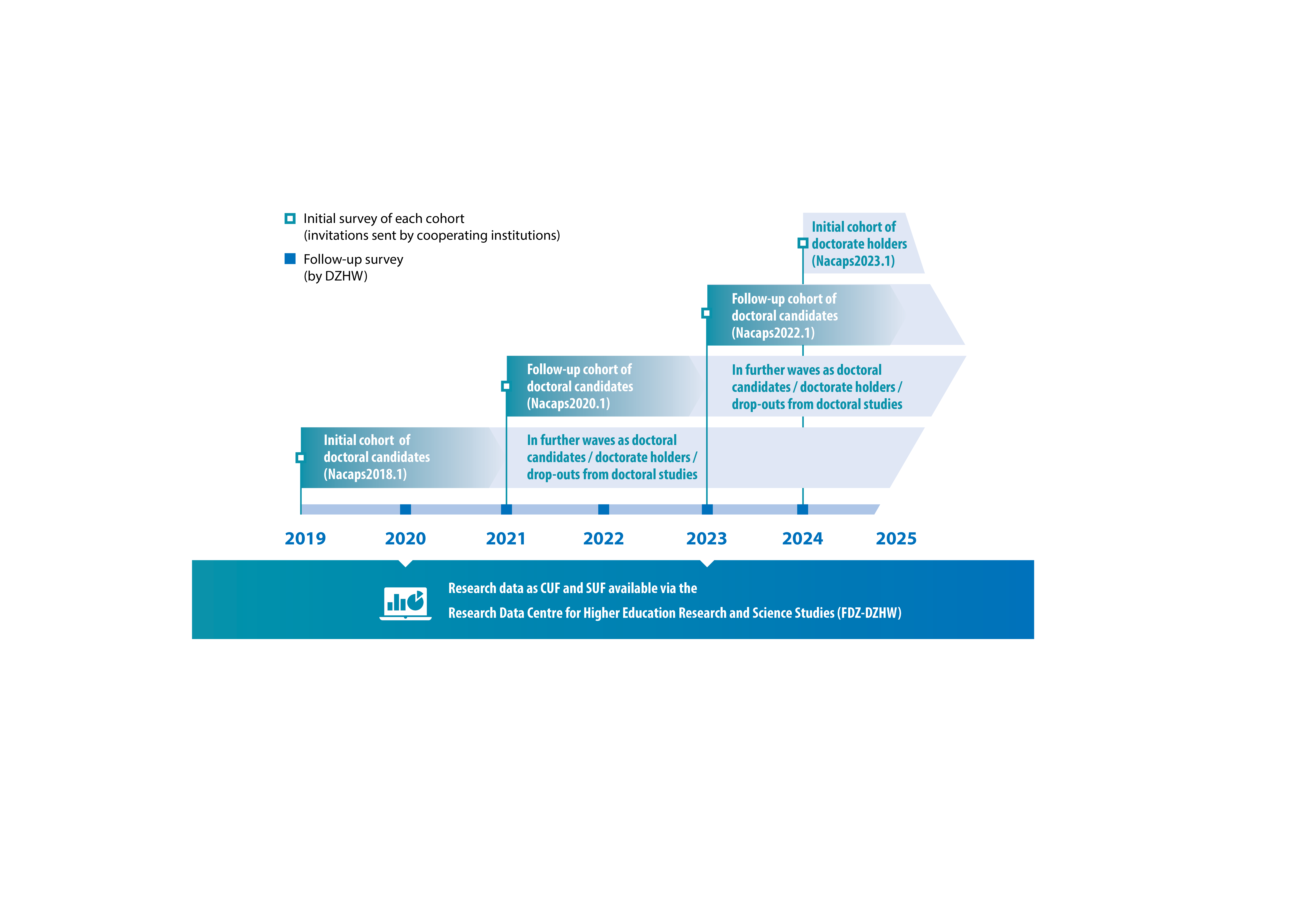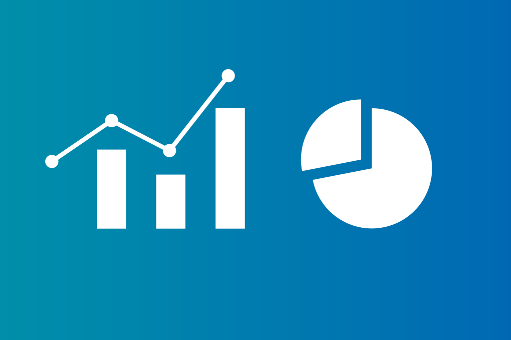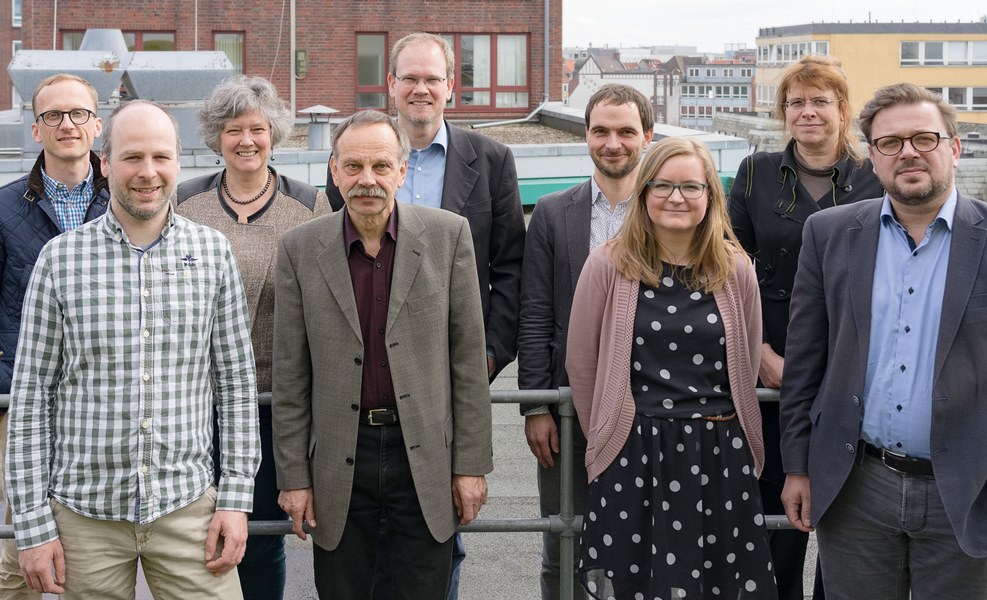
The Study
Nacaps, the National Academics Panel Study, is a longitudinal study of doctoral candidates and doctorate holders in Germany. Doctoral candidates and doctorate holders throughout the country are surveyed at regular intervals on the study conditions for their doctorates, career aims and professional development, as well as on their general life situation.
Background
There is a great demand for systematically collected data on conditions, motives, career prospects and career paths of people who are or were active in the academic world. A range of user groups are looking for a better database on these topics to enable them to make evidence-based decisions:
Support for doctoral candidates and doctorate holders is a key factor in successful higher education and science policy. Qualifying highly educated talent for the academic and non-academic job market is essential to secure a leading position in the global education market and fulfil the demands of a strong innovation based national economy. Young researchers are also expected to make considerable contributions to fulfilling Germany’s and the European Union’s innovation and development targets.
So far, however, little is known in Germany about which institutional conditions of qualification and support or which conditions of knowledge production are particularly helpful in producing outstanding scientific publications or innovations. A solid data foundation is required if this situation is to change.
The study produces valuable data that enable researchers to examine career paths and professional development in more detail than was previously possible. This enables work to be done on many research questions that have remained unaddressed up to now.
The Nacaps longitudinal study aims to systematically collect this data for the first time and as comprehensively as possible, for HEIs, policy makers and researchers.
Further detailed information about the background and research questions, the study design and Nacaps’ sampling concept are contained in the scientific concept for the study.
FAQ - Frequently Asked Questions
Who is funding this study?
The study is being funded by the German Federal Ministry of Education and Research (BMBF).
Who is carrying out the study?
The Nacaps panel study is being implemented by the German Centre for Higher Education and Science Studies (DZHW), an institution that carries out application-oriented empirical research. The main focus of its work is on higher education research with analyses focussing on students and graduates, issues of life-long learning, controlling and funding, as well as on science and organisation research. DZHW’s participation in the National Report on Junior Scholars (BuWiN), the National Educational Panel Study (NEPS), and social surveys, as well as its own relevant panel studies such as ProFile, the doctoral candidates panel, WiNbus, the online panel for early career researchers in Germany, or the “Careers of Doctorate Holders” project, exemplify the Centre’s competence and experience in the field of online surveys in the higher education and science area. The project team combines expertise in empirical social research, technological competence in data management, and years of experience in the implementation and evaluation of longitudinal studies.
Topics
The topics and research issues addressed by Nacaps were developed on the basis of a wide set of theoretical approaches. Our research also includes information that HEIs require for their quality assurance. The diagram gives an overview of the topics covered by Nacaps:
| Motivation and Attitudes |
|---|
|
|
| Personal Background |
|
| Qualification Process |
|---|
|
|
|
| Academic Work |
|---|
|
| Outcomes |
|
|
| Career Paths |
|---|
|
|
Research Questions
Nacaps follows up on current research issues that have long-term relevance, e.g.:
Institutional conditions of qualification and support for young researchers
- How widespread are the various forms of doctoral studies in Germany and what study conditions and support structures do they offer doctoral candidates?
- How do the different formal and informal doctorate contexts and support conditions affect the candidates’ acquisition of skills and the socialisation of early career researchers?
Motives, determinants, selection and self-selection processes
- What determines doctoral success, selection processes or career paths, and how is the relation between structural, individual and ascribed characteristics?
- How are individual decision processes related to institutional and systemic selection processes?
- How effective are recruitment and selection processes for the academic system?
Career paths and prospects, in and outside the academic world
- How do aspects of everyday life or conditions and opportunity structures on the (non-academic) job market influence decisions for or against career paths?
- How does the career situation of doctorate holders in the academic system compare to that of doctorate holders outside academia?
Individual and social outcomes and returns on investment
- What contribution does gaining a doctorate or do early career researchers make to research, teaching, innovation and knowledge transfer?
- What individual and social returns do doctorates yield within and outside the academic world?
Study Design
Target Group and Base Population
The study’s target group is young researchers in Germany. The term “young researchers” here refers to the group of people with a university degree who are gaining/have gained further qualifications for an academic career. Following relevant models, the careers of young researchers are divided into the pre-doctoral phase (studying for a doctorate), and the earlier and later post-doc phases (doctorate holders). In order to gain a representative cross-section of young researchers that reflects this distinction, the study is addressed to both doctoral candidates and doctorate holders.
The base population of doctoral candidates is defined as all doctoral candidates admitted to (registered at) German HEIs, following the University Statistics Act (HStatG section 5). The group also includes external candidates, candidates at non-university research institutions and candidates in cooperation with universities of applied sciences, because the latter must also register at a university that is authorised to award doctorates.
Panel Design and Survey Period
Nacaps is a multi-cohort panel study: on the one hand, several year groups of doctoral candidates and doctorate holders are integrated in a pool of survey respondents during the course of the study. Every two years, a new year group of doctoral candidates is taken up into the panel study. On the other hand, further questions are addressed to these survey respondents, first annually, then every two years, and their career paths are followed for up to 15 years after they gained their doctorates. In this way, every respondent’s individual data are gradually supplemented, thus gaining a longitudinal temporal dimension.
In order to be able to make statements about the further career paths of doctorate holders more quickly, additional doctoral graduates will be integrated into the panel study in 2023.


The study is designed in such a way that the data can be made available for different analytical purposes:
- For both doctoral candidates and doctorate holders, representative cross sections are being surveyed at fixed intervals, to enable us to make general statements about their qualification conditions at that point.
- Biennial cross-sectional surveys with new doctoral candidates and doctorate holders enable us to analyse trends, capturing the dynamics and developments in the academic system.
- By repeated surveys of the same respondents (panel design), longitudinal data are also collected that make individual changes visible, enabling analysis of what has caused them. The planned observation period of the panel study is 15 years after gaining a doctorate. This also makes it possible to look at long-term retention of doctorate holders in academia and the attainment of professorships.
Questionnaires and Instruments
In order to generate versatile research data that can tie in with other data, we drew on a wide set of theoretical approaches when selecting and developing instruments for Nacaps – including e.g. general sociological action theories, socio-cognitive models of choices of professional careers, labour market theory approaches, identity theory and socialisation theory approaches, and network theories.
The individual survey waves focus on current topics at that time.
On the one hand, the questions and survey items are oriented on established instruments whose informative value has already been proved in other studies. This also ensures that the data can also be related to reference data in other studies, to answer such questions as how far employment conditions and prospects of doctorate holders differ from those of non-doctorate holders, for example. The Nacaps team also develops and tests its own scales and items, however.
To ensure the integrity of the questionnaire development process, Nacaps is in steady contact with the national and international expert community, hosts and attends workshops and bilateral discussions, and has conducted cognitive and quantitative pre-tests of the instruments.
The survey is carried out in the form of an online survey with ZOFAR, DZHW’s unique survey system, and the survey data is stored on DZHW‘s own servers.
FAQ - Frequently Asked Questions
What is the purpose of a full population survey of doctorate holders?
The aim of the full population survey is to enable us to provide timely statements about the subsequent career paths of doctorate holders and to gain representative data for a cohort of doctorate holders. These data give us a reference point that can be compared to official statistics for monitoring on the topic of early career researchers. This survey also brings people into the panel study who were previously not included in the doctoral candidates survey, for example in the case of those who completed a doctorate in less than a year.
How is “doctoral candidate status” defined? Who is counted as “taking a doctorate” or as a “doctoral candidate”?
We base our survey of doctoral candidates on the definition given in the German Higher Education Statistics Act (HStatG), according to which doctoral candidates are persons who have received confirmation of their acceptance as a doctoral candidate by an HEI that is authorised to award doctorates (Section 5, HStatG).
How does the study take account of external doctoral candidates at universities of applied sciences?
The study collects data about all groups of doctoral candidates, regardless of whether they are at the same time employed at the HEI as scientific assistants, or members of a doctorate programme, or external doctoral candidates. Candidates under a cooperative doctorate arrangement at a university of applied sciences are also included, because registration always has to take place via an HEI that is authorised to award doctorates.
How does the study take account of doctoral candidates at non-university research institutions?
Doctoral candidates at non-university research institutions are also included, because registration always has to take place via an HEI that is authorised to award doctorates.
How are doctoral candidates included who only register at a later point during the doctorate process?
Due to the survey design and the recruitment of doctoral candidates via the HEIs, all doctoral candidates can only be surveyed from the time when they are accepted as candidates. However, this doesn’t mean that candidates are excluded. People who only register later, after they have started working on their doctorate, join the panel study later. In order to take account of such delays in the evaluation, the survey asks about the date of acceptance as a candidate, but in addition, also asks when the candidate began work on their doctorate, as recommended by the University Association UniWiND and other authorities.
How long does it take to complete the survey?
Depending on the respondent’s answers, the survey takes between 20 and 30 minutes. Basically, the surveys are designed to be as interesting, varied and concise as possible to motivate respondents to take part in further surveys for our panel study.
All FAQ
Data Use
The data collected are:
- available for Nacaps’ partner HEIs for monitoring, controlling and quality management via a data portal
- prepared for the expert public and decision makers in higher education and science policy in the form of reports, as a basis for evidence-based monitoring of young researchers
- accessible to the scientific community for research purposes via the DZHW Research Data Centre (FDZ) in the form of anonymised data sets (scientific use files).
FAQ - Frequently Asked Questions
How can external researchers use the Nacaps study data?
Nacaps makes the data available for scientific examination free of charge in the form of anonymised scientific use files in DZHW’s Research Data Centre. You can find the access conditions on the DZHW Research Data Centre website.
Data Protection
Nacaps gives top priority to guaranteeing the security of all data and excluding the possibility of re-identifying individuals or individual HEIs, in accordance with social science research standards. To hold up these standards, the Nacaps study has been designed with a focus on participant’s privacy from the get-go.
In addition to the German Data Protection Act (BDSG), Nacaps also complies with the currently applicable strict guidelines of the European General Data Protection Regulation (EU-DSGVO) and follows the German Data Forum (RatSWD)’s recommendations for social and economic data.
Thes data protection handout sums up key information abaout data protection regarding the first survey of Nacaps.
FAQ - Frequently Asked Questions
What will happen to the information I give on the questionnaire, i.e. with the survey data?
As soon as the online survey is completed, we will save the survey data separately from the respondents’ names and addresses on DZHW servers that are specially safeguarded for this purpose. Project staff are the only people with access to this protected server area, and only with express permission from the Nacaps project management. The survey data will subsequently be prepared for future use. Before being passed on to third parties such as secondary researchers (on application), we ensure that they are anonymised.
The data are aggregated to varying degrees, depending on the purpose for which they are to be used. Those data that are available via the data portal are allocated to the highest aggregation level; this ensures that it is not possible to trace them back to any individual. To achieve this, technological measures are also taken, e.g. setting a minimum cell size. The project team itself as well as other researchers are only permitted to use the data for statistical evaluations, i.e. for anonymised data processing.
What exactly will happen to my contact data if I participate?
Generally, the contact data will initially be held by your HEI only. In some cases, they will be passed on to us, for the sole purpose of sending invitations, after which they will be deleted.
At the end of the first survey, you will be asked to give us your contact data and your agreement to us contacting you in future for annual follow-up surveys. The information is not mandatory and will not be passed on to third parties. However, Nacaps is dependent on your long-term commitment to provide longitudinal data and we therefore would very much welcome your cooperation in providing your contact details.
Your contact data can be deleted at any time, if you so wish. In this case, please get in touch with us. You can find more information in our handout on data protection.
How did you obtain my address details?
We are carrying out the survey in partnership with the HEI at which you are registered as a doctoral candidate. Therefore you will usually be contacted by your HEI itself in relation to the survey, in the form of an email with a personalised link to enable you to take part in the study. If your HEI has entered into the relevant agreement with DZHW and has passed the address data for the initial survey invitation on to us, you may receive the invitation directly from DZHW. We will delete these contact data after the survey.
Partner HEIs
We have invited all HEIs in Germany that are authorised to award doctorates to become Nacaps partner. Basically, the collaboration consists of the HEIs setting up the contact to survey respondents. In return, DZHW carries out the surveys and offers regular feedback about results to the HEIs.
Since 2018 Nacaps has been cooperating with the following HEIs:
- Akademie der Bildenden Künste München
- Bergische Universität Wuppertal
- Brandenburgische Technische Universität Cottbus-Senftenberg
- Bucerius Law School
- Christian-Albrechts-Universität zu Kiel
- Deutsche Universität für Verwaltungswissenschaften Speyer
- Eberhard Karls Universität Tübingen
- Europa-Universität Flensburg
- Europa-Universität Viadrina Frankfurt [Oder]
- European School of Management and Technology Berlin
- Fernuniversität in Hagen
- Filmuniversität Babelsberg
- Freie Universität Berlin
- Friedrich-Alexander-Universität Erlangen-Nürnberg
- Friedrich-Schiller-Universität Jena
- Heinrich-Heine-Universität Düsseldorf
- Helmut-Schmidt-Universität
- Hertie School of Governance
- Hochschule Fulda
- Hochschule für Bildende Künste Dresden
- Hochschule für Musik Franz Liszt Weimar
- Hochschule für Musik, Theater und Medien Hannover
- Hochschule Geisenheim
- Hochschule RheinMain
- Johann Wolfgang Goethe-Universität Frankfurt am Main
- Johannes Gutenberg-Universität Mainz
- Katholische Universität Eichstätt-Ingolstadt
- Kühne Logistics University Hamburg
- Musikhochschule Lübeck
- Otto-Friedrich-Universität Bamberg
- Otto-von-Guericke-Universität Magdeburg
- Pädagogische Hochschule Freiburg
- Pädagogische Hochschule Heidelberg
- Pädagogische Hochschule Ludwigsburg
- Pädagogische Hochschule Weingarten
- Philosophisch-Theologische Hochschule Vallendar
- Rheinisch-Westfälische Technische Hochschule Aachen
- Ruhr-Universität Bochum
- Ruprecht-Karls-Universität Heidelberg
- Staatliche Akademie der Bildenden Künste Stuttgart
- Stiftung Tierärztliche Hochschule Hannover
- Stiftung Universität Hildesheim
- Technische Universität Clausthal
- Technische Universität Dortmund
- Technische Universität Kaiserslautern
- Technische Universität München
- Universität Bayreuth
- Universität Bielefeld
- Universität des Saarlandes
- Universität Duisburg-Essen
- Universität Hamburg
- Universität Kassel
- Universität Koblenz-Landau
- Universität Leipzig
- Universität Mannheim
- Universität Osnabrück
- Universität Passau
- Universität Potsdam
- Universität Rostock
- Universität Trier
- Universität Ulm
- Universität Vechta
- Universität zu Köln
- Universität zu Lübeck
- WHU – Otto Beisheim School of Management
- Zeppelin Universität
We are in talks about collaboration with a large number of other HEIs.
Scientific Advisory Board

Nacaps is supported by a Scientific Advisory Board. This four-member committee’s task is to monitor the developments and findings of the project in terms of content, and to make suggestions for its further development.
The advisory council’s members are:
- Prof. Dr. Simone Kauffeld (TU Braunschweig)
- Prof. Dr. Erika Kothe (Uni Jena, UniWiND)
- Prof. Dr. Kai Maaz (DIPF, Leibniz Institute for Research and Information in Education)
- Prof. Dr. Henry Sauermann (ESMT Berlin)
